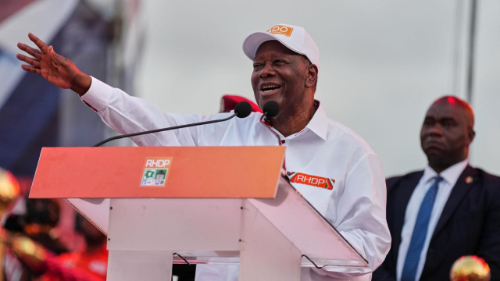Alassane Ouattara Wins Landslide 4th Term as Ivory Coast’s President

TLDR
- Incumbent Alassane Ouattara has won a fourth term as President of the Ivory Coast, per provisional results
- Ouattara, aged 83, secured 89.77 percent of the votes cast, according to the IEC
- Turnout was estimated at around 50 percent, lower than previous high-turnout elections but in line with recent polls
Incumbent Alassane Ouattara has won a fourth term as President of the Ivory Coast, according to provisional results announced by the country’s Independent Electoral Commission (IEC). Ouattara, aged 83, secured 89.77 percent of the votes cast, according to the IEC.
Nearly nine million Ivorians were eligible to vote. However, two major opposition contenders — former president Laurent Gbagbo and ex-Credit Suisse CEO Tidjane Thiam — were barred from running, leaving weaker challengers.
Turnout was estimated at around 50 percent, lower than previous high-turnout elections but in line with recent polls. Observers say the exclusion of key rivals and low engagement reflect both political disaffection and concerns over democratic legitimacy.
Ouattara’s critics accuse him of consolidating power and limiting genuine competition, while his supporters highlight his record of economic growth and improved infrastructure.
Daba is Africa's leading investment platform for private and public markets. Download here
Key Takeaways
Ouattara’s victory comes at a pivotal moment for the Ivory Coast, a country that has enjoyed steady economic growth yet still grapples with youth unemployment, regional inequality and security risks from the Sahel. By securing an unprecedented fourth term, he provides continuity in policy and leadership, but also raises questions over democratic renewal and governance. The sidelining of prominent opposition figures and the legal framework that enabled the fourth-term bid contribute to a perception among many Ivorians that the electoral field was tilted. While infrastructure projects and foreign investment have surged under his tenure, critics say the benefits have not reached large segments of the population. With regional instability and internal divisions increasing, the major challenge for the new term will be turning political dominance into inclusive growth, meaningful jobs for youth, and fostering trust in institutions. Successfully doing so could stabilize the country; failure risks entrenched frustration and social fault-lines.

Next Frontier
Stay up to date on major news and events in African markets. Delivered weekly.
Pulse54
UDeep-dives into what’s old and new in Africa’s investment landscape. Delivered twice monthly.
Events
Sign up to stay informed about our regular webinars, product launches, and exhibitions.




